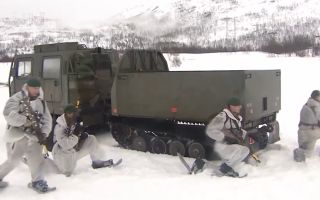Korean War: How it unfolded and why it's technically never ended
Overshadowed by the Second World War, the conflict in Korea is often called the 'Forgotten War' in the West, but more British troops died there (around 1,100) than in the Falklands, Iraq and Afghanistan combined.
This is how the Korean War started, unfolded and ultimately never ended.
The Korean peninsula had been divided along the 38th Parallel after WW2, with the North having Soviet Union-backed communist sponsorship and the South being backed by the US and other allies.
June 1950
The war started on 25 June 1950, when the Communist North's Northern Korean People's Army, under the direction of Kim Il-sung, invaded the South, occupying Seoul.
The US declared a national security threat.
A United Nations Security Council resolution calling upon member states to repel aggression from the North was only passed because Russia boycotted the council in protest.
The UN asked all members to help the South, with Britain among the countries to respond.
August 1950
British ground forces arrive to defend the port of Pusan, a logistical hub, and go straight into action.
September 1950
With South Korea and UN forces pinned down, the Royal Navy launches an amphibious landing 150 miles behind enemy lines.
UN forces rapidly advance north, taking the capital of North Korea Pyongyang, ending up within 40 miles of the Chines border.
November 1950
Alarmed at UN forces coming so close, China declares war and makes its move, pushing UN forces back south.
Winter 1950
UN forces retreat across North Korea and China eventually takes Seoul.
January 1951
General MacArthur considers using the atomic bomb, but tactics and determination win the day.
March 1951
The UN attacks and recaptures Seoul and UN troops reach the 38th Parallel days later.
Spring 1951
UN forces dig in close to the North / South border and one of the bloodiest battles fought by the British Army since the Second World War is about to begin.
April 1951
A massive counter-Chinese attack sees three days of savage fighting, the first Battalion of the Gloucestershire Regiment is cut off and destroyed making a last stand on Hill 235.
It helps break the Chinese advance and mass Chinese attacks are fought off, allowing retreat to a new defensive position covering Seoul.
The conflict then descends into a stalemate.
July 1953
After months of talks, an armistice is signed on 27 July 1953 and established the peninsula-wide demilitarized zone (DMZ) to provide a buffer between military forces.
As with the First World War, this was intended as the first in a two-step process whereby a more official settlement would be agreed the following year.
But the 1954 conference in Geneva ended in diplomatic stalemate and no settlement ever emerged from the proceedings.
That armistice and the DMZ it created still hold today and the war has never been officially over.
In total 2.5 million people lost their lives in the conflict.









